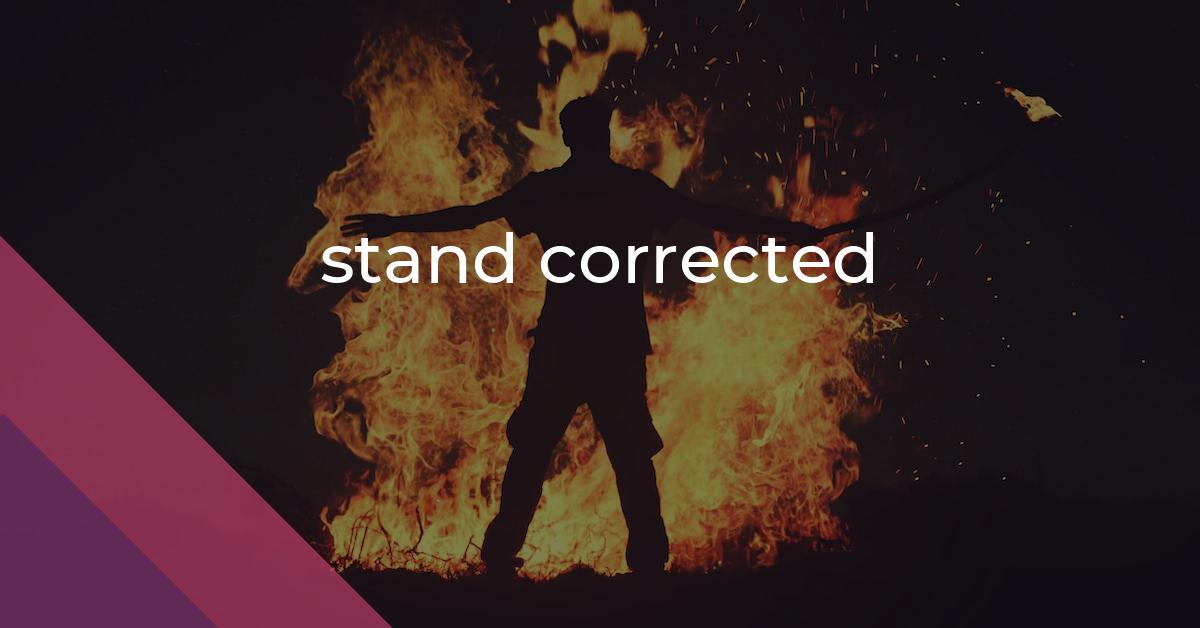stand corrected: Idiom Meaning and Origin
What does ‘stand corrected’ mean?
The idiom "stand corrected" means to admit that you are wrong or to accept someone's correction of your mistake.

Idiom Explorer
The idiom "take the fall" means to accept blame or punishment for a mistake or wrongdoing, often to protect someone else or to avoid greater consequences.
The idiom "take someone's word for it" means to believe or trust what someone says without requiring further proof or evidence.
The idiom "take someone's part" means to support or defend someone in an argument or disagreement, often without considering the opposing viewpoint.
The idiom "take sides" means to choose or support one person, group, or opinion over another, often in a conflict or disagreement.
An idiom meaning that one has to accept a situation or offer as it is, without the possibility of negotiation or change.
The idiom "take a stand" means to publicly express one's opinion or position on a certain issue, often in a bold and assertive manner.
The idiom "sure enough" means that something expected or predicted actually happened or turned out to be true. It is used to confirm or validate a previous statement or belief.
The idiom "strike one's flag" means to surrender or admit defeat, often used in the context of a confrontation or competition.
The idiom "straighten out" means to resolve or clarify a confusing or chaotic situation, or to correct someone's behavior or thinking.
Stand one's ground means to refuse to back down or give up in a confrontation or argument, maintaining one's position or opinion firmly.
Clarifying Misunderstandings
The idiom "stand corrected" is a commonly used phrase in the English language. It indicates admitting an error or mistake and accepting the correct information or perspective provided by someone else. This phrase is used when someone's knowledge on a subject has been proven inaccurate or incorrect.
The origin and meaning of "stand corrected" are straightforward. "Stand" means to take a firm position or maintain a specific opinion or belief. "Corrected" refers to being set right or accurate. Together, "stand corrected" suggests admitting an error or misconception and changing one's stance based on the correct information or evidence presented.
The idiom "stand corrected" can be traced back to the mid-19th century, originally used in legal and parliamentary contexts as a formal acknowledgment of an error or mistake made in a statement or argument. Over time, it entered everyday conversation and became widely recognized.
When someone says "I stand corrected," they demonstrate humility and intellectual honesty by admitting they were wrong and accepting the accurate information or correction provided by another person. This idiom reflects a willingness to learn, grow, and revise opinions or beliefs in light of new evidence or facts.
Furthermore, "stand corrected" conveys accountability and responsibility for previous assertions. It implies taking ownership of mistakes and promptly rectifying them. By using this expression, individuals recognize the importance of accuracy, integrity, and the pursuit of truth.
The idiom "stand corrected" is a powerful phrase that symbolizes an individual's capacity to acknowledge and rectify mistakes. It portrays humility, intellectual honesty, and a willingness to embrace new information and perspectives. The popularity and longevity of this idiom highlight its enduring relevance and universal applicability.
The idiom "stand corrected" is related to other idioms such as "eat crow," "climb down," and "set straight."
The idiom "eat crow" is used when someone has to admit they were wrong or apologize for a mistake. It is often used in a more informal and humorous context. While "stand corrected" focuses on admitting an error and accepting the correct information, "eat crow" emphasizes the humility and apology aspect of being wrong.
The idiom "climb down" is similar to "stand corrected" as it also refers to admitting an error or mistake. However, "climb down" specifically implies retracting or stepping back from a previous position or assertion. It suggests a change in one's stance or perspective, similar to "stand corrected."
Lastly, "set straight" is another related idiom that aligns with "stand corrected." It means correcting a misunderstanding or providing the correct information to someone who has been misinformed or mistaken. "Setting someone straight" involves enlightening them with the accurate facts or perspective, leading them to admit their error and change their stance, just like "stand corrected."
Example usage
Examples of how the idiom "stand corrected" can be used in a sentence:
- I always thought the capital of France was Paris, but after doing some research, I stand corrected. It is actually Lyon.
- My colleague claimed that our project would be completed by the end of the month, but when it didn't happen, they had to stand corrected.
- During the debate, the politician made a false statement, and the fact-checker quickly stood corrected by providing accurate information.
More "Error" idioms



